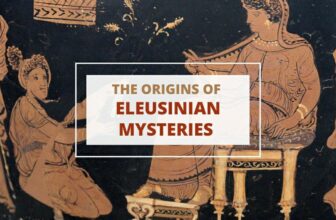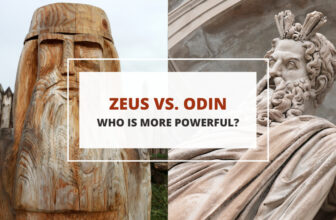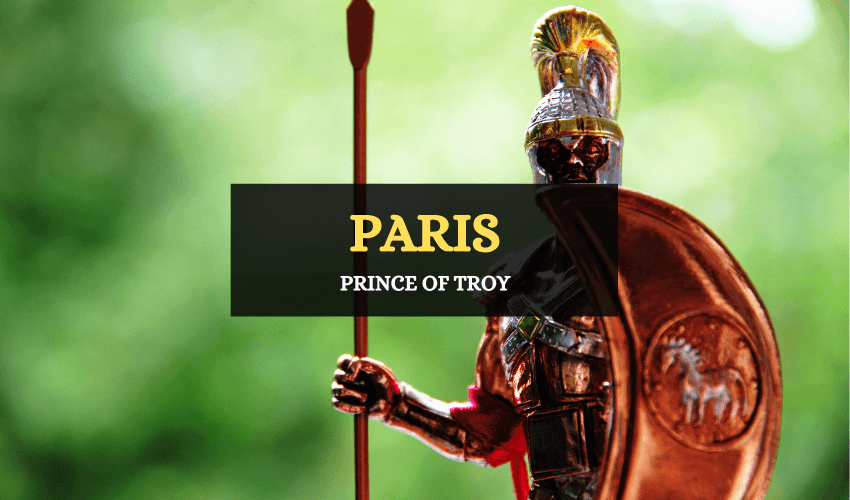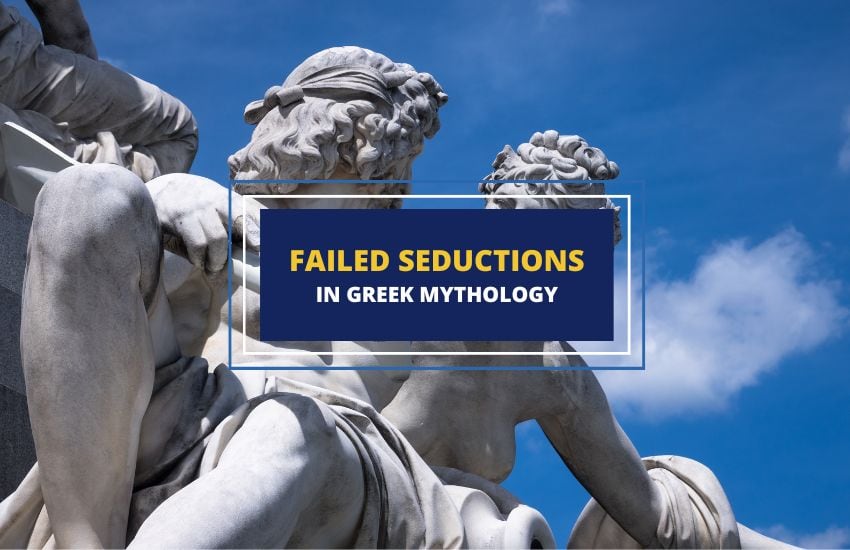
Table of Contents
In dozens of Greek myths, the Gods have not always been the most charming or affectionate. They are depicted as tyrannical and ruthless, neglecting their duties and responsibilities while making room for their base desires.
In most cases, this resulted in the Gods lusting after mortals, nymphs, and even other deities. Some would use charm and deception to seduce their lovers, while others were not so subtle.
More often than not, the Gods would be satisfied. However, in certain instances, their victims would evade them.
Let’s talk about ten failed seduction attempts recorded in Greek mythology.
1. Pan and Syrinx
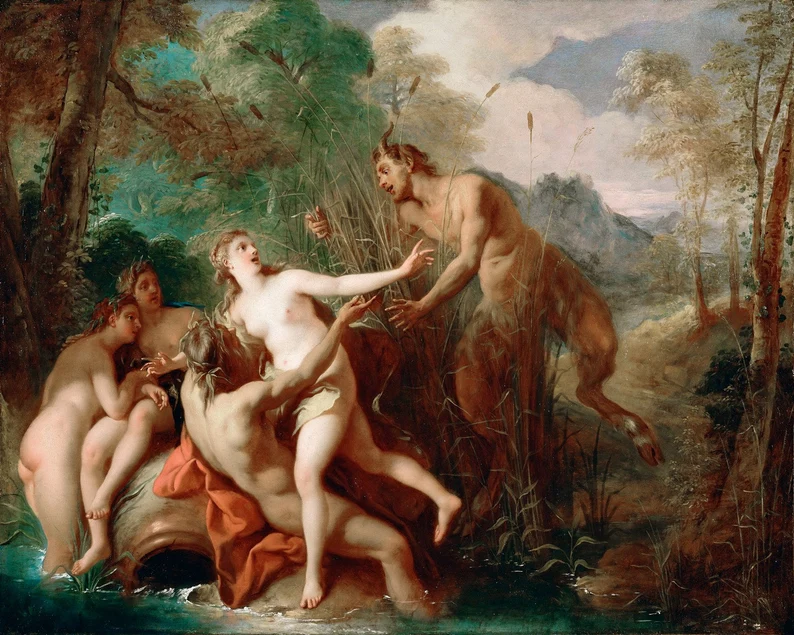
One of the most exemplary stories of a romantic encounter gone wrong is the woeful meeting between the Satyr known as Pan and Syrinx, a water nymph.
One day, while seeking shade in the forest, he came across Syrinx, a skilled hunter and devout follower of Artemis.
Enthralled by her beauty, Pan lusted after her. But, determined to protect her virginity, she rejected his advances and tried to flee.
She could have easily outrun Pan but made a wrong turn and ended up at the banks.
Desperate, she pleaded to the Gods who transformed her into Cattail Reeds.
While she managed to escape Pan and retain her chastity, she had at a terrible cost. Although his attempts at seduction had failed, Pan didn’t give up. He then took the Cattail Reeds and fashioned them into a pan flute.
2. Salmacis and Hermaphroditus
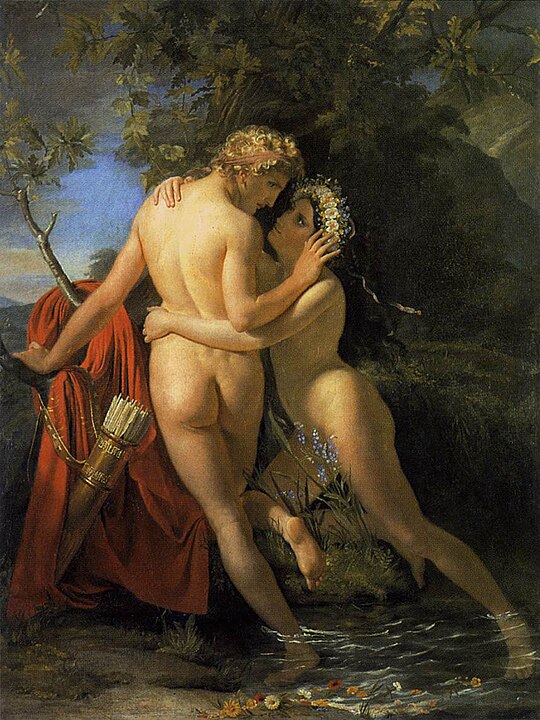
As another tale that exemplifies a foiled attempt at love, the myth of a beautiful river nymph Salmacis and a son of two gods Hermaphroditus is quite peculiar.
Hermaphroditus, as you probably can already tell, was the son of Hermes and Aphrodite. Salmacis was a river nymph who often inhabited the river that Hermaphroditus would bathe in.
As such, he was a regular at the swimming hole, and had seen everything of Hermaphroditus. Nothing was left to the imagination, if you get what our gist.
Captivated by his dashing good looks, Salmacis fell in love with Hermaphroditus and professed her love. Sadly, Hermaphroditus was not impressed and blatantly rejected her advances.
Feeling hurt, she sought help from the Gods, asking them to unite her with him. Taking things literally, the Gods agreed, marrying them into a single person.
They fused her with Hermaphroditus, turning him into a being possessing both male and female organs and creating the word “Hermaphrodite.” I guess the moral of this story is not to speak in metaphors when asking the Gods for favors.
3. Apollo and Daphne
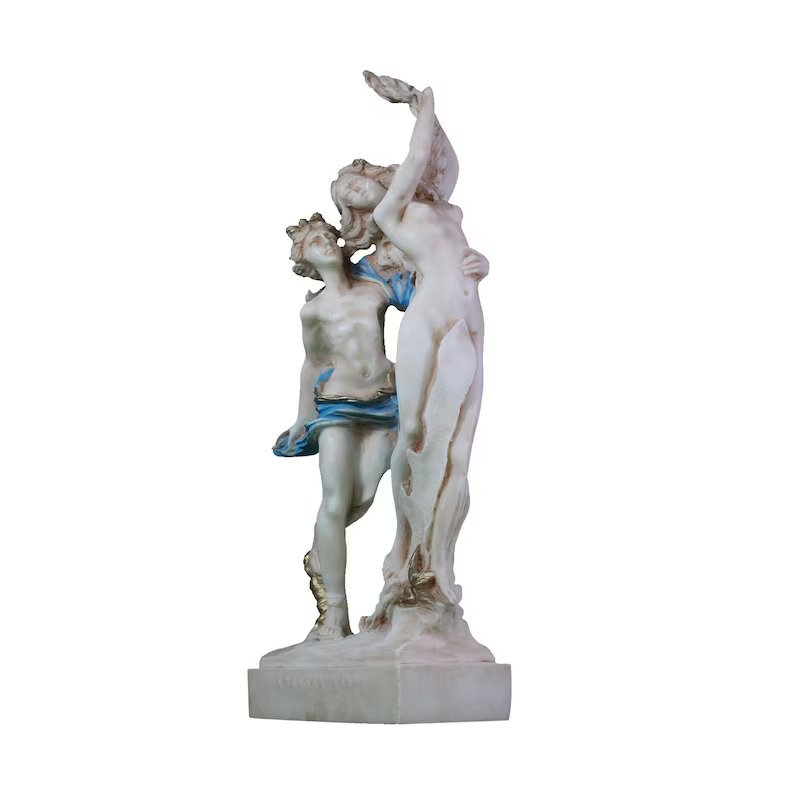
The tragic myth of Apollo and Daphne is a well-known tale involving the birth of the laurel wreath and themes of transformation.
Daphne was a naiad and the daughter of the river God Peneus. She was said to be exceptionally graceful and charming but vowed to remain a virgin.
The God of light and music Apollo had angered Eros (Cupid) after a heated discussion about who’s bow was better. In anger, Eros struck Apollo with one of his arrows, which meant that he would fall in love with the first person he saw. This happened to be Daphne. Apollo then began to chase her, full of lust and feelings for her.
Consent wasn’t a big thing for the Greek gods and most of them would just trick the object of their lust into sleeping with them or take them by force. Apollo seems to have chosen the second option. Daphne knew this and ran away from Apollo.
Realizing she couldn’t outrun him forever, she pleaded to the Gods for help. As usual, in their own twisted way, the Gods transformed her into a laurel tree.
Distraught, Apollo broke a few branches of the tree and fashioned them into a wreath. He promised to wear it forever as a reminder of the beautiful Daphne.
4. Apollo and Cassandra
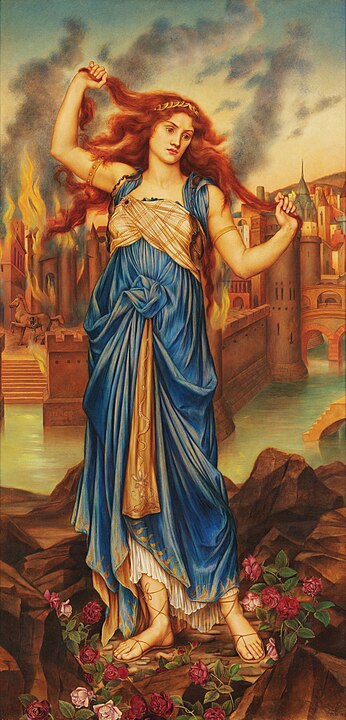
Another fruitless endeavor of Apollo was Cassandra. Cassandra was the daughter of King Priam of Troy, who played a role in the Trojan War.
In many accounts, she’s depicted as a beautiful maiden who was wise as she was beautiful. Apollo, turned on by her beauty and impressed by her intellect, desired Cassandra and wanted to gain her affection.
Infatuated, he tried to win her over by granting her the gift of foresight. She accepted his blessing and, as promised, could see into the future.
Assuming that she was impressed, Apollo made his move. Sadly, he was rejected as Cassandra regarded the God of light and prophecy only as a teacher and not a lover.
So, what did Apollo do? He cursed the poor woman so that no one would believe her prophecies even though they would come true.
The curse materialized in many forms. Cassandra accurately predicted the Trojan War and the famous incident regarding the wooden horse. As ill luck would have it, nobody heeded her words, and she was killed by Agamemnon.
5. Theseus and Ariadne
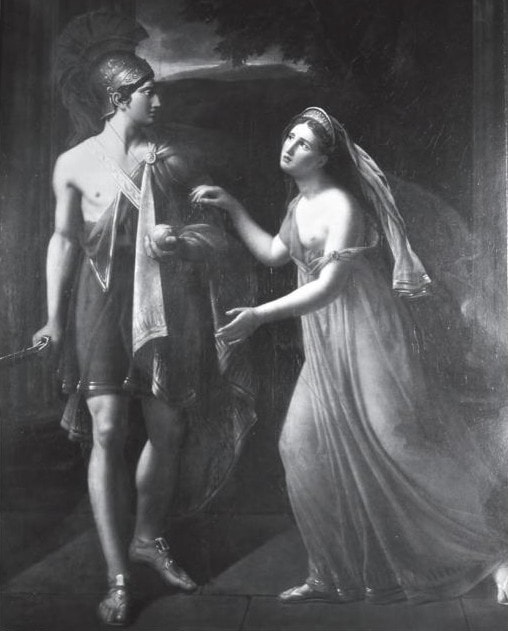
With a direct tie-in to the legend of Theseus and the Minotaur, Ariadne is a popular character in Greek mythology who eventually failed in her attempts to seduce the brave hero.
Ariadne met Theseus when he volunteered to travel to Crete and slay the Minotaur who lived within the great labyrinth. Attracted by his good looks, she gave him a sword and showed him how to make his way into the maze and back without getting lost.
Heeding her advice, Theseus managed to slay the bull and make it out of the labyrinth successfully. After this, he and Ariadne escaped from the island and the clutches of her father. But sadly, Theseus didn’t remain true to Ariadne, and he abandoned her on the island of Naxos. In other words, he used her to get what he wanted and then left.
6. Alpheus and Arethusa
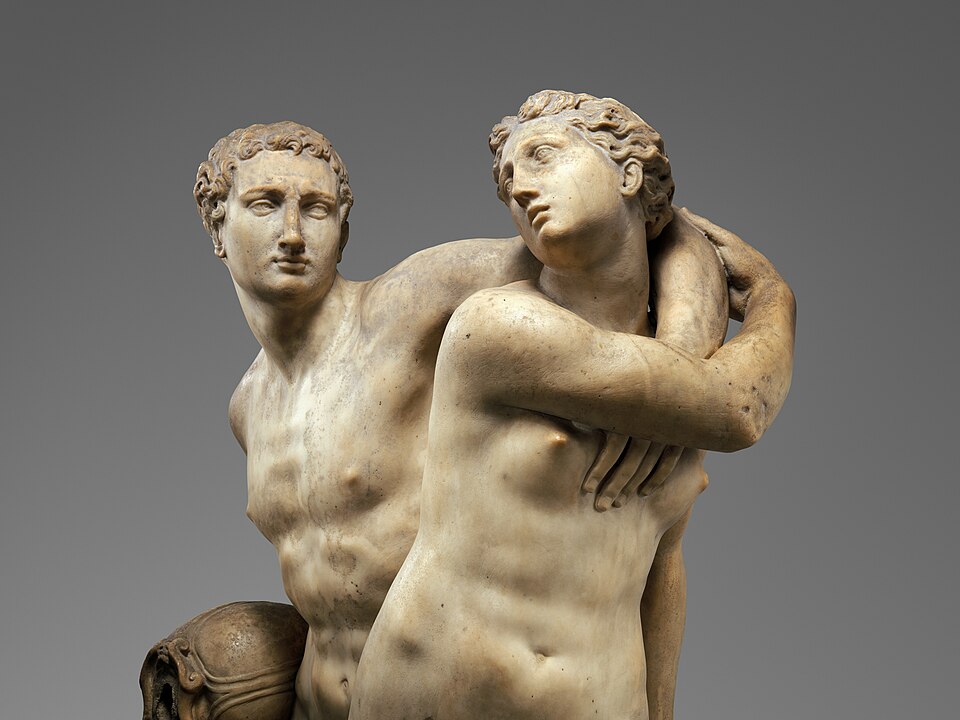
The myth of Alphaeus and Arethusa is not very well-known, but it’s an interesting story nonetheless.
In this tale, Arethusa was a follower of Artemis and a respected member of the Goddesses’ hunting party or retinue.
Alpheus was a river god who fell in love with Arethusa after watching her bathe in one of his rivers.
One day, determined to win her affection, he appeared before her and professed his love. Unfortunately, as a devout follower of Artemis, she couldn’t (or wouldn’t) consent.
Angered by this rejection, Alpheus started to chase after Arethusa. He followed her to Syracuse in Sicily. Realizing he wouldn’t let up his pursuit, Arethusa prayed to Artemis for help to protect her virginity.
In response, Artemis transformed Arethusa into a spring.
7. Athena and Hephaestus
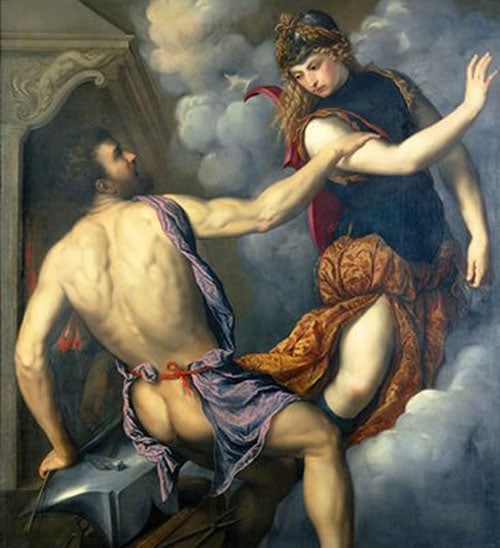
Hephaestus was the God of fire and blacksmithing. He was the son of Zeus and Hera, but unlike the other Gods who were good looking and impressive, he is described as being ugly and lame.
After his divorce from Aphrodite, the Goddess of beauty, he set his sights on Athena, the Goddess of wisdom.
Captivated by the Goddess, who visited his forge one day to request some weapons, he dropped whatever it was that he was doing and began to harass Athena.
Athena was determined to protect her chastity. Before he could do anything too serious, she managed to fend him off and wipe away the seed of Hephaestus. This then dropped onto the Gaia, the Earth, who bore him a son who would become Erikthonios.
8. Galatea and Polyphemus
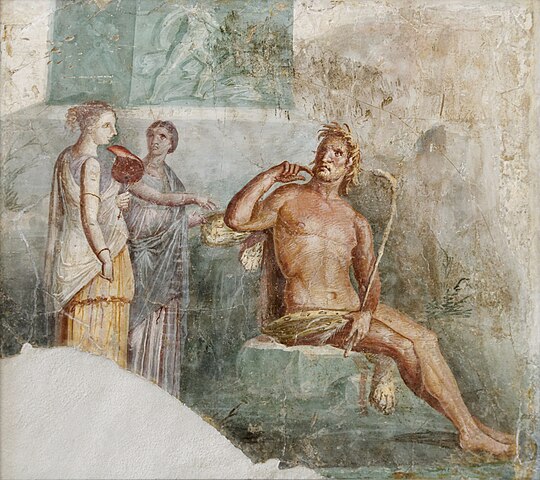
Polyphemus was the son of Poseidon, the great sea God, and the sea nymph Thoosa. In many accounts, he is depicted as the one-eyed cyclops who met Odysseus and his men.
However, before Polyphemus was blinded, he would go down in history as the Cyclops who almost wooed Galatea.
Polyphemus was living on his own and tending to his sheep. One day, he heard the graceful voice of Galatea, a sea nymph, and was enthralled by her voice and more so, by her beauty.
He began to spend his time spying on the graceful Galatea, fantasizing about her and mustering up the courage to profess his love.
Sadly, one day he witnessed Galatea making love to a mortal, Acis. Enraged, he rushed over and dropped a boulder on Acis, crushing him to death.
However, this didn’t seem to charm the startled Galatea, who ran away, cursing Polyphemus for this heinous act.
9. Poseidon and Medusa
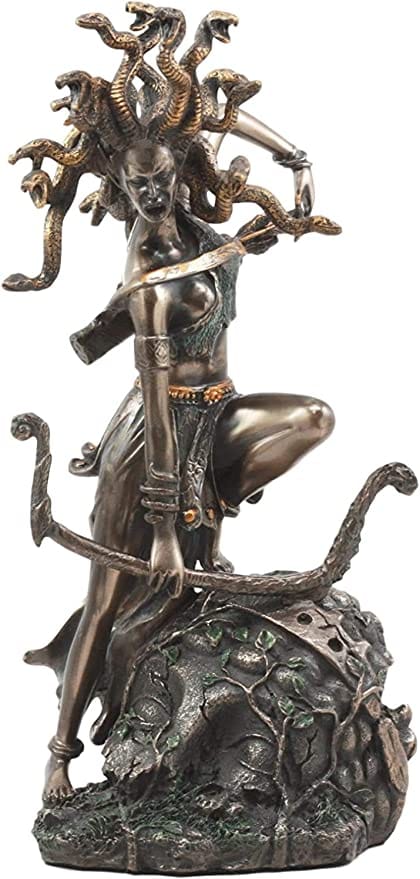
Before she transformed into a hideous creature with snakes for hair, Medusa was a beautiful maiden who was a devoted priestess in the temple of Athena. Poseidon was mesmerized by her beauty and decided to seduce her.
Medusa ran away from him, but he caught up to her and took her by force into Athena’s temple. While Poseidon got what he wanted, things didn’t go that well for Medusa.
Athena was furious that Poseidon and Medusa had desecrated her temple. Talk about victim-shaming! Shen then punished Medusa by transforming her into a monster so hideous that whoever gazed upon her was turned to stone.
10. Zeus and Metis
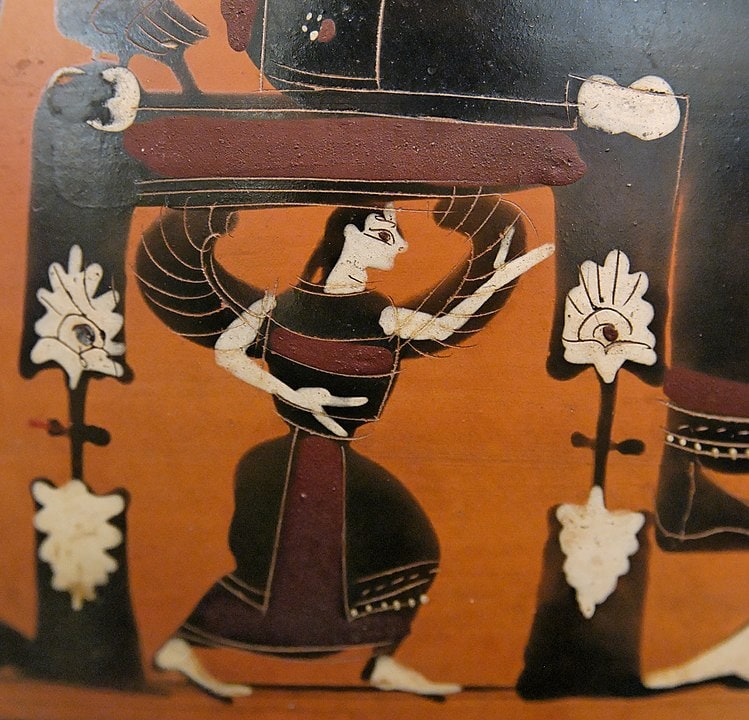
Metis, the Titaness of wisdom and deep thought was one of Zeus’s many wives. The story goes that Zeus married Metis because it was prophesied that she would bear extremely powerful children: the first being Athena, and the second a son who would be more powerful than Zeus himself.
Fearful at the prospect, Zeus had no other option but to prevent the pregnancy or kill Metis. When Metis found out about this, she transformed into a fly to escape Zeus, but he caught her and swallowed her whole.
According to the myth, Athena later emerged fully grown from Zeus’s forehead. As a result, there’s a sense in which Zeus himself gave birth to Athena, incorporating Metis’s wisdom as he did so. The second child, the potential threat to Zeus’s power, was never born.
Wrapping Up
So, there you have it – ten classic Greek mythology facepalms where even the gods and goddesses couldn’t make their crushes fall for them. From Apollo striking out with Daphne, to Salmacis getting a bit too clingy with Hermaphroditus, these tales remind us that love isn’t something you can force. Not to mention, they show that jumping the line can backfire big time.
These stories serve as some age-old reminders that, hey, sometimes things just don’t go your way in the game of love, and that’s okay. Because let’s be honest, even in mythology, no means no. Remember, whether you’re a god or a mere mortal, it’s all about respect.




